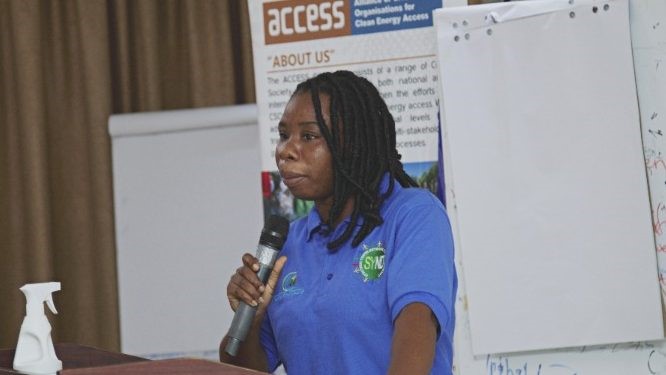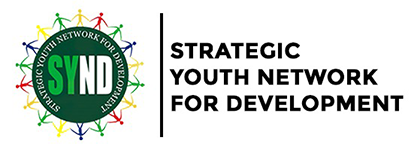
A youth-led environmental group, Strategic Youth Network with Development (SYND), is calling on the government to establish cook stove factories in coastal communities to upscale fish smoking and ensure food safety.
In week-long research on energy access in Ghana, the Energy Focal Point for SYND, Priscilla Adogo Ahiada, says the factories will help curb unemployment among fisherfolk which is caused by the high cost of fuel.
“This will be beneficial to indigenous fishermen. They can be employed on a part-time basis [in the fish smoking business] to help solve unemployment issues”, she said.
Miss Ahiada, who addressed the media at Ampomah Hotel in Accra, called on the government to “support companies of clean cook stoves for households to make it affordable and accessible by all”.
She further stated that government needs to “intensify the distribution of clean cook stoves to inner towns as their transitioning would not be difficult since they have already transitioned from firewood to charcoal; they will just use less charcoal when using the clean cook stoves.”
The research focused on Atwima Kwanwoma, Tamale Metropolitan District, and Cape Coast Metropolitan District in Ashanti, Northern and Central Regions respectively.
According to SYND, the research exercise feeds into the government’s free distribution of 500,000 clean cook stoves in terms of the next steps on policy directions in its community engagement on clean cook stoves across Ghana.
Below is the full press release:
FOR IMMEDIATE RELEASE
FEBRUARY 24, 2022
COMMUNITY ENGAGEMENT ON CLEAN COOKSTOVES IN SOME PARTS OF THE ASHANTI, NORTHERN AND CENTRAL REGIONS OF GHANA.
The Strategic Youth Network for Development (SYND) embarked on a clean cooking research from the 1st – 7th February, 2022 in some parts of the country. The objectives were to:
- Know participants’ experience on the use of the various cooking equipment.
- Understand their choice of using a particular cooking equipment.
- Determine the number of households using a clean cooking stove.
- Assess the distribution of free clean cook stoves distributed by the government of Ghana.
Ghana launched an improved cooking distribution project which will see the manufacturing and free distribution of 500,000 improved charcoal stoves in Ghana to 350,000 rural households across the country by 2021 which will benefit approximately 1.8 million Ghanaians. The $5.5million project is funded by the South Korea Government. The use of these improved and efficient charcoal stoves, coupled with the ongoing reforestation programmes, is expected to reduce significantly the emission of carbon dioxide and the rate of deforestation in the country.
The research exercise therefore is intended to feed into government’s free distribution of 500,000 clean cook stoves in terms of the next steps on policy directions. Broadly, it’ll also feed into achieving SDG 7 (Clean and affordable energy), Sustainable Energy for All (SE4All) and the Nationally Determined Contributions (Gh-NDCs). The SE4ALL Country Action plan for example concentrates on two main sources of clean modern energy – Liquefied Petroleum Gas and Improved Cook stoves as solutions to high rates of deforestation in the country as a result of the felling of trees for charcoal production and reducing acute lower respiratory infections (for example, pneumonia), as well as in many other respiratory, cardiovascular and ocular diseases as result of, air pollution from cooking with solid fuels.
The sampling areas for the study were Atwima Kwanwoma, Tamale Metropolitan District and Cape Coast Metropolitan district in Ashanti, Northern and Central Regions respectively.
Study Design
This study is a Cross Sectional Design which has a distinctive feature; a reliance on existing difference rather than change following intervention and the selection of the groups are based on existing differences rather than random allocation. The study measures differences between or from among a variety of subjects rather than the change process. The study used this study design because cross-sectional designs generally use survey techniques to gather data.
The mixed method approach was employed because qualitative and quantitative approaches were used in data collection and analysis (Creswell & Clark, 2007)
Sampling Techniques
The study focused on two main categories of respondents: key informants and community members.
Purposive sampling was used to select key informants CEO, marketers at Holy Cook and assembly members of some communities. The study also employed the convenience sampling based on lead contacts in the various communities to investigate the preferred types of cooking equipment and fuels used for cooking.
Findings:
- That the women interviewed had less or no knowledge on clean energy and its benefits.
- Women who are using charcoal can transition easily into using cleaner ways of cooking like using the cook stoves. Thus women who use firewood said they use the charcoal produced from the firewood into cooking.
- Women who were using the clean cook stoves were using LPG as backups.
- In Banvim, the women stated that charcoal was the only option available for them to use in cooking.
We recommend;
- Stakeholders’ consultation with women in fishing communities on commercialization of larger clean cook stoves for smoking on a large scale.
- The establishment of cook stove factories in areas like Aidan as this can be beneficial to indigenous fishermen who are unable to go fishing due to the rise in fuel prices and can be employed on part time basis to help solve unemployment issues.
- Government should intensify the distribution of clean cook stoves to inner towns as their transitioning would not be difficult since they have already transitioned from firewood to charcoal; they will just use less charcoal when using the clean cook stoves.
- Rekindle the awareness on cook stoves as it was done in the past. Older folks still remember the awareness creation message of the “Agyapa cook stove”
- CSOs should promote young people on clean cooking through education and advocacy to create employment opportunities.
- Government should partner with CSOs in advocacy and education on health and environment implications of clean cook stoves.
- Government should support companies of clean cook stoves for households to make it affordability and accessible by all.
Conversation between a participant and one of the researchers:
“As you can see I am about to prepare fufu and light soup using the clean cook stove. I can use less charcoal to boil my cassava and plantain and still use the same fire left to prepare my soup. I can even use the heat in the cook stove to boil water when I am done. Using the cook stove has really helped me save money.”
Author








